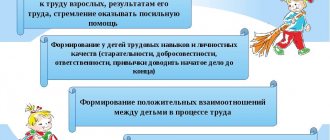Consultation for parents on the topic: Labor education in the family
Consultation for parents.
Topic: “Labor education in the family” Author: Lyubov Nikolaevna Komova, teacher at MBDOU “General developmental kindergarten No. 90”, Cherepovets. Description of the material: This material is compiled in the form of recommendations for the labor education of preschool children. The consultation will be useful for educators and parents of children aged 4 to 7 years.
Goal: developing the competence of parents in the issue of labor education. Objectives: To attract the attention of parents to the importance of labor education in the life of a child. Arouse parents' interest in joint work with their child at home. Progress: Labor education
is an important means of comprehensive development of a child’s personality. Hard work is not given by nature, but must be cultivated from early childhood. The main purpose of work is its influence on the child’s personality. Reasonably organized work strengthens the physical strength and health of the child. Movements become more confident and accurate. As he acts, the baby becomes more and more oriented in space. Work also has a significant impact on the mental development of a child. It develops intelligence, curiosity, initiative, active perception, observation, attention, concentration, and trains memory. And work also develops thinking - the child has to compare and contrast objects and phenomena with which he deals. Emphasizing the invaluable importance of work for the comprehensive development of a child’s personality, I bring to your attention some recommendations for labor education in the family. The work of children in the family must be feasible. It is not at all necessary to entrust cleaning the entire apartment to the baby, but asking him to wipe the dust from the windowsill is quite possible. Use the opportunity - interest. Any child is interested in working with a vacuum cleaner. He won’t work much, of course, but he will gain some skills.
At the first stages, work activity is not stable; it is closely related to children’s games. The connection between work and play is important in preschool age - play images help children do work with greater interest. It is easier to teach a child to work while playing. For example, your house is a spaceship, and it needs to be cleaned before departure. Young children easily humanize inanimate objects - this quality can be used effectively. Tell your child on behalf of the toy that it is cold for her to lie on the floor, or let the bear ask to be put on the shelf.
Never force your child to help you. Coercion is disgusting. Moreover, work done under duress is not of high quality. Help must come from a pure heart. It is clear that the child may not notice that it is difficult for you and that you would not mind accepting help from him. Here you can cheat a little: groan and groan: “Oh, how tired I am,” “Oh, my back hurts.” It’s a rare child who doesn’t realize that his help would be in place. What kind of help with housework can preschool children provide? The range is quite wide. In addition to cleaning his room, the baby can help his mother prepare for dinner, for example, in setting the table. The child is quite capable of watering indoor plants and feeding pets.
Remember, when giving instructions to a child, it is necessary to clearly explain what is being done, why, and why. The child needs to know why he should perform certain tasks and what result should be achieved. This is the only way for preschoolers to form an idea of the need for these actions. Therefore, we always need to explain why we are working. For example, if flowers are not watered, they may die; If we don't wash the dishes, we'll have to eat from dirty dishes. The work of a child should not go unnoticed by adults. Any work should be encouraged: thank the child, praise, appreciate his efforts. Even if the child did something wrong. And if he breaks something, don’t even think about scolding him, because the child wanted to help. Work and its results must be accompanied by positive emotions. [Gradually, the child develops a positive attitude not only to those types of work that are associated with play, but also to those that are not so interesting, but necessary, that is, there is an awareness of the importance of work activity. The activities of adults serve as role models for children. If the adults themselves work with enthusiasm, then the child will strive for the same. When a child sees that work for adults is a heavy burden, then he himself will have the same attitude. Therefore, parents themselves should take on any work with desire, diligence and responsibility, setting a good example for their children. Teach your child to complete the work he has started, do not rush or rush the child, know how to wait until he completes the work himself.
In parallel with labor education, it is necessary to cultivate respect for the work of adults and careful attitude towards its results. Words of notation, as you know, are unconvincing methods for a child. He must see the good example of adults. Only the systematic fulfillment of work duties will help to develop preschoolers’ organization, responsibility, and habits of work effort, which is so important for preparing a child for school.
We recommend watching:
Education and development of preschool children. Tips for parents Labor education in kindergarten Labor education in kindergarten Labor education of preschool children
Similar articles:
Instilling responsibility in organizing the work activities of preschool children
Entertainment in the senior group of the kindergarten "People's Labor"
Summary of a lesson on labor education in the preparatory group. Inventions and achievements of man
Consultation for parents. Introducing preschoolers to work
Contents of types of work of preschool children
Self-care: Starting at a young age, preschoolers need to develop self-care skills. But during this period, due to physiological characteristics, children are still unable to perform some actions:
- babies’ fingers are not yet completely obedient;
- the sequence of performing some actions is not always remembered;
- they have not yet developed the ability to control their will.
Work for a child should be feasible and interesting.
These moments are difficult for a child, therefore, the likelihood that they will cause denial is high. What should parents and kindergarten teachers do? Nothing special, just be patient, calm and friendly. Only such means can help a child calmly accept requests to wash his face and brush his teeth in the morning, tidy up his crib, dress and undress independently, and put his toys in order.
Self-service
The means and techniques for mastering self-care activities are quite simple:
- all procedures must be performed regularly;
- monitoring the performance of actions by adults;
- the requirement on the part of adults to do all work carefully, to be tidy and to maintain cleanliness.
Self-service is the first type of work
Advice to parents: older preschoolers should be introduced to school clothes and attributes, the child’s vocabulary should be replenished, and care should be taught in handling these items. For example, prepare clothes with your child in the evening, carefully hanging them on the high chair.
Household labor
Preschoolers must master economic skills and be able to do household work. A child is quite capable of wiping dust on furniture and door handles. The child must represent the content of household work. Methods of labor education allow children in each age category to master new labor actions.
Helping parents is an example of domestic work
The means of developing skills and abilities to perform household work are varied: the child can help set the table, tidy up after himself, sweep the floor. In kindergarten, children are on duty, they also set tables, water flowers, and wipe dust on shelves and cabinets.
Adults need to adjust the content of work depending on their age group.
Advice: do not forget to praise the child, guide him, but in no case scold him, only then the educational goal will be fulfilled.
Work in nature
Labor skills performed in the natural environment are excellent means of experiencing the beauty of one’s native land, developing observation skills and improving movements. The tasks that are presented to this type of work activity are the development of volitional qualities, strength and endurance.
Cleaning the area - outdoor work
What means of labor education are used in this type of work? Children of primary preschool age can feed the fish and birds while walking. Older preschoolers can be assigned to water the flowers in a group. Parents can set similar tasks for their child at home. If the kindergarten has a corner of nature, then children can provide all possible assistance in caring for pets. Also interesting are such means as growing onions or herbs in a jar on the window, as well as observing and caring for plants sprouted from seeds.
Caring for vegetables is a very effective way of labor education
Such means of instilling a love of work in nature are very effective; children become kinder and enjoy the process of work.
Manual labor
Preschoolers should be taught to work with their hands. These are various crafts, working with different types of materials. In classes in kindergarten, children learn the skills of working with natural materials and using various improvised means and paper in creativity.
Children love to make crafts
Manual labor is designed to solve such problems as developing perseverance, developing a sense of aesthetics and patience.
Forms and methods of organizing the educational process
In a kindergarten group, children can do the following work, the purpose of which is labor education:
- Orders are the simplest methods. The baby is given a specific task that he completes. The system of individual orders has proven itself well.
- Duty - kids learn to be responsible for the assigned task, to be careful and efficient.
- Common work solves the problems of moral education. It is introduced in senior and preparatory groups.
- Business relationships are built between preschoolers in the process of common work.
What are the main means for instilling a love of work in preschoolers?
The example of adults is the best means of labor education
. Basic means:
- own labor process, which is carried out by preschoolers;
- familiarization with the process of work performed by adults;
- knowledge of the labor process through creativity and artistic development.
So, in the process of labor education, preschoolers should develop the concept of the labor process. Attitude to work and work activity, skills to perform certain types of work appropriate to age.
Preschool teachers and parents must act in cooperation and close cooperation.






